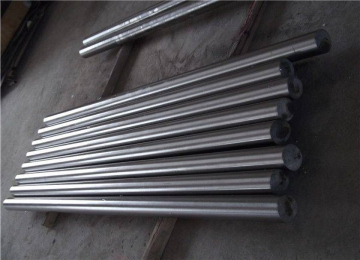
4J78 alloy is also known as non-magnetic fixed expansion porcelain sealing alloy. The expansion coefficient of this type of alloy is low. Adding a small amount of copper to the alloy can enhance its processing performance. Most of the non-magnetic sealing materials used in electric vacuum devices are of this kind. Made of alloy.
Performance characteristics of 4J78 alloy
4J78 alloy has the following main performance characteristics:
Low magnetism: 4J78 alloy has very low magnetism, making it very suitable for use as non-magnetic porcelain sealing materials. This ensures that gyroscopes and other electrical vacuum devices are not disturbed by external magnetic fields during operation.
Stability: The alloy has high chemical stability and can maintain good performance under high temperatures and harsh environments. This stability allows 4J78 alloy to maintain its properties and functionality during long-term use and high-temperature applications.
Good corrosion resistance: 4J78 alloy has good corrosion resistance to air, water and some common acids and alkali. This enables the alloy to effectively resist corrosion and extend service life in a variety of working environments.
Good processing properties: The alloy has good plasticity and processability, making operations such as forming, cutting and welding relatively easy during the manufacturing process. This provides manufacturers with convenience while ensuring product accuracy and consistency.
It should be noted that the specific performance characteristics of 4J78 alloy may also be affected by the specific manufacturer and processing method, so detailed performance data and specifications should be consulted with the alloy manufacturer or relevant literature.
chemical composition of 4J78
4J78 alloy has high corrosion resistance in atmosphere, seawater and tropical climate conditions. The specific chemical composition is shown in the table below:
Material | 4J78 | |||||||
chemical composition | C | P | S | Mn | Si | Mo | Cu | Ni |
≦ 0.05 | ≦ 0.02 | ≦0.02 | ≦0.4 | ≦0.3 | 20.0-22.0 | ≦1.5 | margin | |
mechanical properties of 4J78
Elastic properties: Elastic modulus E=222GPa
Hardness: The hardness of alloy (soft state) at room temperature HV=234~247
The tensile properties of 4J78 alloy (soft state) at room temperature are shown in the table below:
σb/MPa | σs/MPa | δ(L0=50mm)/% |
869 | 353 | 35 |
Physical properties of 4J78 alloy
Density ρ=9.38g/cm3.
Resistivity ρ=1.17μΩ·m.
Melting temperature range 1400~1420℃
Magnetic performance standards stipulate μ16000≤1.251×10-3mH/m. The magnetic permeability of the alloy under different magnetic field strengths is shown in the table below:
H/(A/m) | 4000 | 8000 | 12000 | 16000 | 32000 | 40000 | 80000 |
μ/(10-3mH/m) | 1.251 | 1.251 | 1.251 | 1.251 | 1.251 | 1.251 | 1.250 |
4J78 linear expansion coefficient
θ/℃ | 20 | 300 | 600 |
| θ/℃ | 20~500 | 20~600 |
λ/(W/(m·℃)) | 13.8 | 15.5 | 16.7 |
|
| 12.1~12.7 | 12.4~13.0 |
θ/℃ | 20~100 | 20~200 | 20~300 | 20~400 | 20~500 |
/10-6℃-1 | 11.3 | 11.6 | 11.8 | 12.1 | 12.4 |
20~600 | 20~700 | 20~800 | 20~900 | 20~1000 | 20~1050 |
12.5 | 13.2 | 13.7 | 14.2 | 14.7 | 15 |
4J78 variety specifications and supply status
For 4J78 alloy, its varieties, specifications and supply status usually include the following:
Rod
pipes
plate
wire material
Strip
Regarding the supply status of 4J78 alloy, there are generally the following types:
Heat treatment state (Annealed): The alloy after heat treatment has lower hardness and better machinability. Suitable for applications requiring further processing and shaping.
Cold-worked: Alloys that have been cold-worked have higher hardness and better strength. Ideal for applications requiring higher strength and corrosion resistance.
Heat treatment system of 4J78 alloy
Regarding the heat treatment system of 4J78 alloy, the information you provided is that the treatment is carried out in a protective atmosphere or vacuum. Here are the specific steps:
Heating: Heating 4J78 alloy to a temperature range of 1000~1050℃. Ensure that heating is performed in a protective atmosphere or vacuum environment and that the temperature is evenly distributed.
Heat preservation: Keep the alloy heat preservation within the target temperature range for 30 to 40 minutes to ensure that solid solution elements are fully dissolved and evenly distributed.
Cooling: Cool the alloy to below 300°C at a speed of no more than 5°C/min. Such a cooling rate can control the structure and properties of the alloy and prevent stress and deformation caused by excessive cooling.
Smelting and casting process of 4J78 alloy
For the smelting and casting process of 4J78 alloy, vacuum induction furnace is mainly used for smelting. The following are the general smelting and casting process steps:
Prepare raw materials
smelting
degassing
pouring
Cooling and solidification
Sand removal and post-processing
Application overview and special requirements of 4J78 alloy
Application overview:
4J78 alloy is mainly used as a non-magnetic porcelain sealing material in gyroscopes and other electric vacuum devices. This alloy provides stable performance in these applications.
special requirements:
Heat treatment control: During use, the heat treatment process needs to be strictly controlled to ensure that the alloy has good processing properties. Heat treatment can include steps such as heating, holding and cooling, and the specific process parameters should be optimized and controlled based on the properties of the alloy and application requirements.
Processing properties: The processing properties of alloys are critical to the manufacture of gyroscopes and other electric vacuum devices. The alloy should have good plasticity, processability and heat resistance to facilitate operations such as forming, cutting and welding during the manufacturing process.
In short, when 4J78 alloy is used as a non-magnetic porcelain sealing material in gyroscopes and electric vacuum devices, it needs to be strictly controlled in terms of heat treatment process and processing performance to ensure its performance and reliability.

